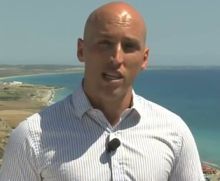 Everything you need to know about the weekend’s coverage of Israel and the Mideast. Join the Israel Daily News Stream on Facebook.
Everything you need to know about the weekend’s coverage of Israel and the Mideast. Join the Israel Daily News Stream on Facebook.
Today’s Top Stories
1. Weekend buzz zeroes in on reports of a new US National Intelligence Estimate asserting that Iran has made significant atomic advances. See Ronen Bergman’s coverage in YNet.
As far as Israel is concerned, introducing the centrifuges to Fordo has made the facility “immune,” even if partially, against an Israeli strike, which is likely to find it difficult to ram through the fortified mountain-side facility.
According to the report, while the US and Israel may disagree on the timeframe of a possible attack, there are in complete agreement over the intelligence. “There is nothing that we know that you don’t know,” a top American official said. “The opposite is true as well – your intelligence shares everything with us.”
The White House reax? No comment.
2. After admitting to plagiarism, Fareed Zakaria was suspended by both Time and CNN, while the Washington Post said it was reviewing his columns as well. Portions on Zakaria’s essay on gun control were strikingly similar to a New Yorker piece on the same topic.
Zakaria first got on my radar when he was writing for Newsweek. In the immediate aftermath of 9/11, he penned an essay whose title became a buzzword for terror apologists: The Politics of Rage: Why Do They Hate Us?

3. Turkey arrested blogger Roee Ruttenberg near border with Kurdish Syria. Ruttenberg, who has US and Israeli passports, was able to update his 972 blog from a Turkish police station in Ceylanpinar before his eventual release:
My dual nationality, I’m convinced, set them off. Around here, this is a big problem with the Kurdish population. The town we were filming, Ras al Ayn, is almost entirely Kurdish. So is the Turkish town of Ceylanpinar just across the border where we were standing. The Turkish government is never that Kurdish separatists, namely the PKK, will begin using the northern Syrian area to launch attacks against Turkey, similar to what’s being done in the automous Kurdish province in northern Iraq. And it’s pretty much an open secret here — whether true or not — that the Israelis are arming and training the PKK. One of the Turkish officers, who looked at my passport, asked, “Yehud?” He later asked me, in broken English, “Eh, you, eh, soldier?”
But the point is, I’m out and I’m fine, and leaving Turkey today (as was the plan all along).
Gaza-Sinai Terror Ties
• AP: Egyptian forces kill 7 jihadis in latest clashes.
• Mahmoud Abbas called on Egypt to tighten its Gaza blockade and destroy smuggling tunnels. According to the Jerusalem Post, it’s the first time Abbas ever publicly made such a statement:
Dismissing claims that the tunnels were being used to prevent a humanitarian crisis in the Gaza Strip, Abdel Raheem said they served only a small group of people – a reference to Hamas leaders.
“The tunnels have nothing to do with economic prosperity in the Gaza Strip,” he stressed.
• Hamas parried back with an unprecedented request: a joint Hamas-Egypt border protection force. According to the Times of Israel, Egypt would shut down the tunnels while Hamas would get a big time boost of legitimacy. But don’t worry. The BBC reports that Morsi’s government is more interested in reaching out to Bedouin tribal leaders — and they’re not sympathetic to Hamas:
Another tribal leader, Eid Abu Marzuka, said the tribes had also reached a consensus that the tunnels should be destroyed.
“Let Hamas be upset, we don’t care,” he said, of the Islamist group that controls the Gaza Strip.
• Reuters discovers terror in the Sinai — quote marks notwithstanding:

• A number of papers picked up on a NY Times report that Washington and Cairo are discussing assistance to take back the Sinai:
The Pentagon is discussing a variety of options for sharing intelligence with Egypt’s military and police in Sinai. They include intercepts of cellphone or radio conversations of militants suspected of plotting attacks and overhead imagery provided by aircraft — both piloted and drones — or satellites, the officials said.
• Sinai coverage lacks depth, argues Jared Malsin (Columbia Journalism Review). The lawlessness makes the area too dangerous for reporters to spend meaningful time digging into the story behind the story:
Reporters agreed that the lack of access is affecting the quality of coverage. “I think it skews the narrative of what’s happening out there and why these attacks are happening and what the population of the Sinai really wants,” Cunningham said, pointing out, for example, that many Bedouin make a political distinction between the police and the military, and do not support attacks on the latter.
Indeed, what gets lost in much of the short-term reporting on the Sinai is the political roots of the instability in the region, which is long-term neglect by the Egyptian central government.
Contrast that with a NY Times staff-ed about the Sinai situation. Most of the piece addresses Morsi’s domestic considerations and acknowledges that there’s a lot about the crackdown we don’t know. But it ends off with a shallow conclusion:
Egypt and Israel could be forced to finally figure out how to work together to confront extremism and improve border security.
• Despite the fog of war, I still hate it when headlines conflict over fundamental facts like this:
• Nice analysis at The Economist.



